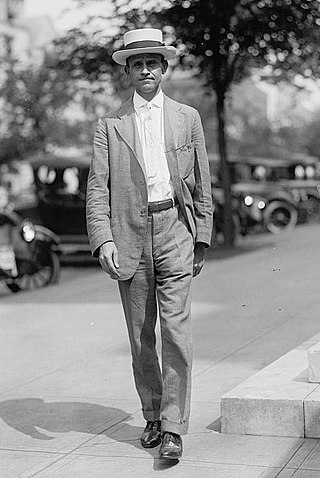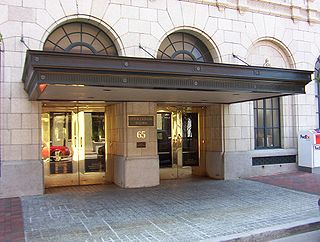
Cotton is a soft, fluffy staple fiber that grows in a boll, or protective case, around the seeds of the cotton plants of the genus Gossypium in the mallow family Malvaceae. The fiber is almost pure cellulose, and can contain minor percentages of waxes, fats, pectins, and water. Under natural conditions, the cotton bolls will increase the dispersal of the seeds.

A commodity market is a market that trades in the primary economic sector rather than manufactured products, such as cocoa, fruit and sugar. Hard commodities are mined, such as gold and oil. Futures contracts are the oldest way of investing in commodities. Commodity markets can include physical trading and derivatives trading using spot prices, forwards, futures, and options on futures. Farmers have used a simple form of derivative trading in the commodity market for centuries for price risk management.
In finance, a futures contract is a standardized legal contract to buy or sell something at a predetermined price for delivery at a specified time in the future, between parties not yet known to each other. The asset transacted is usually a commodity or financial instrument. The predetermined price of the contract is known as the forward price or delivery price. The specified time in the future when delivery and payment occur is known as the delivery date. Because it derives its value from the value of the underlying asset, a futures contract is a derivative.
A futures exchange or futures market is a central financial exchange where people can trade standardized futures contracts defined by the exchange. Futures contracts are derivatives contracts to buy or sell specific quantities of a commodity or financial instrument at a specified price with delivery set at a specified time in the future. Futures exchanges provide physical or electronic trading venues, details of standardized contracts, market and price data, clearing houses, exchange self-regulations, margin mechanisms, settlement procedures, delivery times, delivery procedures and other services to foster trading in futures contracts. Futures exchanges can be organized as non-profit member-owned organizations or as for-profit organizations. Futures exchanges can be integrated under the same brand name or organization with other types of exchanges, such as stock markets, options markets, and bond markets. Non-profit member-owned futures exchanges benefit their members, who earn commissions and revenue acting as brokers or market makers. For-profit futures exchanges earn most of their revenue from trading and clearing fees.

The Commodity Futures Trading Commission (CFTC) is an independent agency of the US government created in 1974 that regulates the U.S. derivatives markets, which includes futures, swaps, and certain kinds of options.

ICE Futures U.S.—known as the New York Board of Trade (NYBOT) until September, 2007— is a physical commodity futures exchange located in New York City. It is a wholly owned subsidiary of Intercontinental Exchange (ICE).

Korea Exchange is the sole securities exchange operator in South Korea. It is headquartered in Busan, and has an office for cash markets and market oversight in Seoul.
Zhengzhou Commodity Exchange, established in 1990, is a futures exchange in Zhengzhou, one of the four futures exchanges in China. The ZCE is under the vertical management of China Securities Regulatory Commission (CSRC).

Asbury Francis "Frank" Lever was a member of the United States House of Representatives from South Carolina.

Agrifutures Australia, formerly the Rural Industries Research and Development Corporation (RIRDC), is an Australian statutory corporation set up by the Australian Government in 1990 to help fund research and development in Australian rural industries.

The Memphis Cotton Exchange is located in downtown Memphis, Tennessee, United States, on the corner of Front Street and Union Avenue. It was founded in 1874 as a result of the growing cotton market in Memphis, where trade was strong after the American Civil War. The first Cotton Exchange building was constructed in 1885. It was replaced by the Exchange Building in 1910, which housed it until a newer Cotton Exchange Building was completed in 1925.

Commodity Exchange Act is a federal act enacted in 1936 by the U.S. Government, with some of its provisions amending the Grain Futures Act of 1922.

The Grain Futures Act is a United States federal law enacted September 21, 1922 involving the regulation of trading in certain commodity futures, and causing the establishment of the Grain Futures Administration, a predecessor organization to the Commodity Futures Trading Commission.

Multi Commodity Exchange of India Ltd (MCX) is a commodity exchange based in India. It was established in 2003 by the Government of India and is currently based in Mumbai. It is India's largest commodity derivatives exchange. The average daily turnover of commodity futures contracts increased by 26% to ₹32,424 crore during FY2019-20, as against ₹25,648 crore in FY2018-19. The total turnover of commodity futures traded on the Exchange stood at ₹83.98 lakh crore in FY2019-20. MCX offers options trading in gold and futures trading in non-ferrous metals, bullion, energy, and a number of agricultural commodities.
The Forward Markets Commission (FMC) is the regulatory body for the commodity market and futures market in India. It is a division of the Securities and Exchange Board of India, Ministry of Finance, Government of India. As of July 2014, it regulated Rs 17 trillion worth of commodity trades in India. It is headquartered in Mumbai and this financial regulatory agency is overseen by the Ministry of Finance. The Commission allows commodity trading in 22 exchanges in India, of which 6 are national.

The Cotton Futures Act of 1914 authorized the United States Department of Agriculture to establish physical standards as a means of determining color grade, staple length and strength, and other qualities and properties for cotton. It was intended to minimize speculative manipulation of the cotton market.

Thomas Bryant Cotton is an American politician, attorney, and former military officer serving as the junior United States senator from Arkansas since 2015. A member of the Republican Party, he served in the U.S. House of Representatives from 2013 to 2015.
A commodity trading advisor (CTA) is US financial regulatory term for an individual or organization who is retained by a fund or individual client to provide advice and services related to trading in futures contracts, commodity options and/or swaps. They are responsible for the trading within managed futures accounts. The definition of CTA may also apply to investment advisors for hedge funds and private funds including mutual funds and exchange-traded funds in certain cases. CTAs are generally regulated by the United States federal government through registration with the Commodity Futures Trading Commission (CFTC) and membership of the National Futures Association (NFA).
A managed futures account (MFA) or managed futures fund (MFF) is a type of alternative investment in the US in which trading in the futures markets is managed by another person or entity, rather than the fund's owner. Managed futures accounts include, but are not limited to, commodity pools. These funds are operated by commodity trading advisors (CTAs) or commodity pool operators (CPOs), who are generally regulated in the United States by the Commodity Futures Trading Commission and the National Futures Association. As of June 2016, the assets under management held by managed futures accounts totaled $340 billion.











